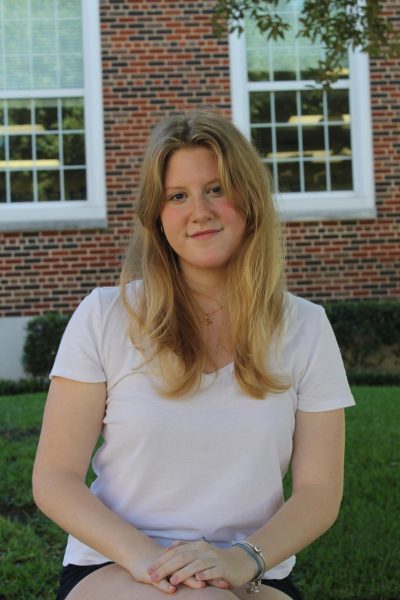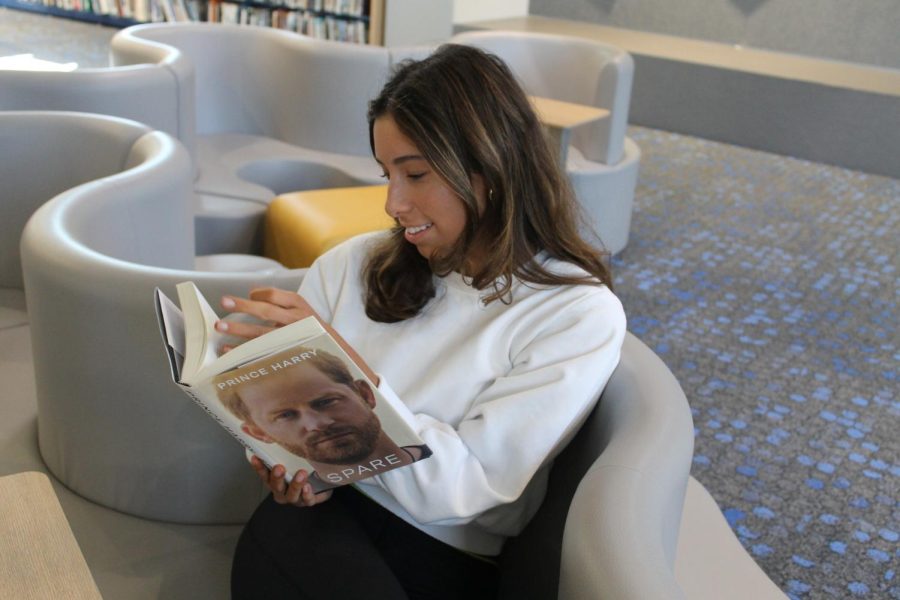Prince Harry Releases Memoir
Prince Harry’s Book “Spare” represents the effects of media intrusion
In the library senior Gracie Braner reads “Spare.” The memoir was published on Jan. 10.
“Spare,” a book by Prince Harry, despite the rough start in the prologue, developed into an interesting story.
Memoirs are probably one of my favorite genres, but all of the memoirs I’ve read always have a baseline of relatability for me, mostly being a woman or the immigrant parent’s experience or emotions.
When I picked up this book and began to read it, I realized “Spare” did not offer that.
I was most interested in the first and second parts of the book, Harry’s adolescence combined with his military career. I didn’t focus as much on his “Meghan Years” because I already knew a lot about their split from the royal family.
I think the most unsettling part of “Spare” is the start of the book. The prologue is best described as one word, “rough.” It was a struggle to read for me. Maybe it was the writing style with what felt like shifts between tenses where they did not deserve to be, or perhaps it was the overuse of imagery—every other paragraph being a straight description—either way, it was hard. Even now reflecting on my reading, I’m unsure if the writing got better or I just got used to it.
Ghostwritten by J.R. Moehringer, “Spare” is Harry’s life thus far condensed into 416 pages. From the death of Harry’s mother, Princess Diana, to his childhood schooling—note that this school involved the students being washed in a tub by “the matrons” until the age of 13—or the barrage of paparazzi, he is simply not a relatable man, which made this harder to read for me.
The title of “Spare” is meant to signify that Harry was the latter of the “heir and the spare.” He was never the priority between the two brothers and that drew a certain divide between the two. When you think of “Spare,” you think of the brother who will be king if the first dies. Harry’s duties as the spare went past this. He was expected to be there for organ donation or blood transfusions. His purpose was like buying a wrecked car of the same model as your current one, to slowly be stripped of its parts when the first is damaged. It is a truly heart-wrenching existence.
Harry jumps into part one of his adolescence most when his mother died. Princess Diana was an angel, not only to him but to all of Britain. Harry struggled with the idea of her death or more of her lack of death in his eyes. For his formative years, he believed she was in hiding. She remained a figure in his life posthumously. He would wake up asking himself when she would come back. It’s such an emotionally-raw section, how he just kept on waiting, because without the evidence in his mind, she was alive.
Right after his mother’s death, he moves into the phase of life where everything he does is publicized and there is no privacy. Harry becomes the “naughty” brother, the one doing drugs or getting into trouble. He explains he never wanted this title, he was just given it.
He wanted so desperately to be the good one, but when the press painted him out to be the bad kid, it never went away. From discovering girlfriends to disrupting military missions, paparazzi and reporters never stopped talking about him. It made his life a living hell, always careful with what he could do.
My favorite part of the entire book was Harry’s experience in Africa. When you think of the royal family in Africa, it is bad news.
In Harry’s case, he actually blossomed as a person there and met some of the people who I thought were the most pivotal in his life—Teej and Mike to him or Tania Jenkins and Mike Holding. Teej and Mike were a couple Harry met in Botswana, which Harry ended up bonding with.
The two were filmmakers who had fallen in love after a blind date. The day after the blind date, Teej went to Mike’s for coffee, where she fell in love with his bookshelf. I think they bonded the best because Teej and Mike did not handle Harry with kid gloves and Harry was willing to work with them. Teej became a mother figure to the point where Harry called her “mom.”
I didn’t expect to get so invested in his time in Africa. He took rented boats up rivers and experienced the wildlife in such a unique way.
Mike sat down with Harry and told him to use his influence to get more interest in Africa. The next day, they went on boats up the river where Harry gets to be face-to-face with an elephant and that’s where it clicked for him.
The biggest takeaway I got from “Spare” was its humanization of Harry. The royal family— and most celebrities—are so far away from you. We do not treat them like people. We treat them like animals in a zoo, peering in with eyes gripped to every motion. It is not respectful.
Harry shows the real effects of how it made him and his wife feel and I think that eventual showing made it a must-read for most. Despite the initial writing style, it is a collection of excellent emotionally-raw stories that everybody must read.

Lord Huron, Ethel Cain, and Alex Turner.
What is your dream career?
Finance bro/nun.
What unconventional animal do you wish you could have as a pet?
Sheep.



